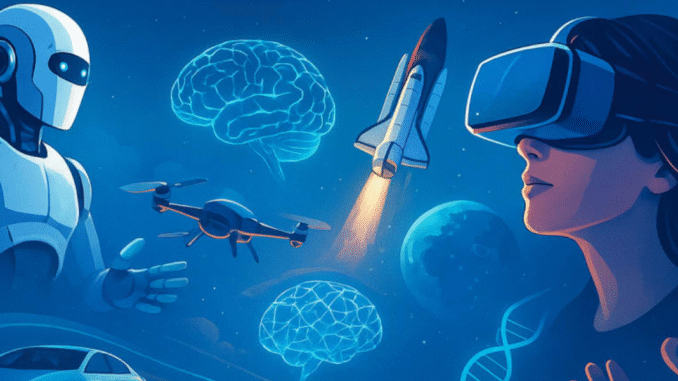
Introduction
Technology is evolving faster than ever. In just a few years, we’ve seen AI assistants, 5G networks, electric cars, and advanced robotics become part of everyday life. But this is only the beginning. By 2030, a new wave of emerging technologies will completely redefine how we live, work, and communicate. From quantum computing to space-based internet, here are the top 10 innovations set to change the world.
1. Artificial Intelligence (AI) and Machine Learning (ML)
AI is already transforming industries—from healthcare to finance—and by 2030, it will be even more powerful. Machine learning models will learn faster and require less data, making them smarter and more efficient. We’ll see AI doctors diagnosing diseases, AI teachers providing personalized education, and AI-driven cities optimizing traffic and energy use.
2. Quantum Computing
Quantum computing will be one of the most revolutionary advances in history. Unlike traditional computers that use bits (0s and 1s), quantum computers use qubits, which can process multiple possibilities simultaneously. This allows for problem-solving at unimaginable speeds—helping scientists develop new medicines, improve cybersecurity, and simulate complex systems like climate models.
3. 5G and Beyond (6G Networks)
5G is already changing mobile connectivity, but by 2030, 6G will take it to another level. With lightning-fast speeds and nearly zero latency, 6G will make real-time holographic communication possible. Imagine attending a concert or business meeting as a 3D hologram from the comfort of your living room.
4. Biotechnology and Genetic Engineering
Advancements in biotechnology will allow humans to live longer and healthier lives. Through CRISPR gene-editing, scientists can modify DNA to eliminate inherited diseases, improve crop yields, and even grow lab-made organs. By 2030, personalized medicine will be standard—tailored to each person’s genetic profile.
5. Renewable Energy Technologies
The global shift toward clean energy is unstoppable. Solar panels, wind turbines, and hydrogen power are becoming cheaper and more efficient. Future cities will run on smart grids powered entirely by renewable energy sources, reducing pollution and slowing climate change.
6. Internet of Things (IoT) and Smart Cities
By 2030, over 100 billion devices will be connected to the Internet of Things. Everything from your car to your refrigerator will communicate with each other. Smart cities will use IoT sensors to manage traffic, control pollution, and conserve energy automatically—making urban life safer and more efficient.
7. Blockchain and Decentralized Finance (DeFi)
Blockchain technology will move far beyond cryptocurrency. It will revolutionize banking, supply chains, and identity verification. By 2030, digital IDs, smart contracts, and decentralized finance will give people more control over their data and money—reducing the need for traditional middlemen.
8. Space Technology and Satellite Internet
Private companies like SpaceX, Blue Origin, and others are making space travel more accessible. By 2030, we might have commercial space tourism and permanent lunar bases. Meanwhile, satellite constellations will deliver fast internet to even the most remote corners of the planet—bridging the global digital divide.
9. Augmented Reality (AR) and Virtual Reality (VR)
The metaverse era is coming. AR and VR will merge the physical and digital worlds, allowing us to interact with virtual environments in real time. From remote work and online education to gaming and design, immersive reality will become a key part of daily life.
10. Robotics and Automation
Next-generation robots will be smarter, safer, and more flexible. They’ll assist in hospitals, build houses, and even care for the elderly. Combined with AI, robotics will play a major role in solving labor shortages and boosting productivity across multiple industries.
Conclusion
The decade leading up to 2030 will be marked by innovation and transformation. These emerging technologies will bring solutions to global problems like climate change, inequality, and healthcare access—but they’ll also raise new challenges related to privacy, ethics, and security. The future belongs to those who embrace technology responsibly and use it to improve humanity’s collective well-being.

Leave a Reply